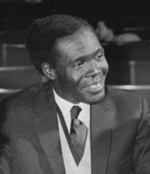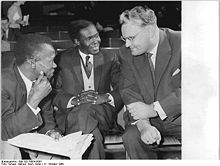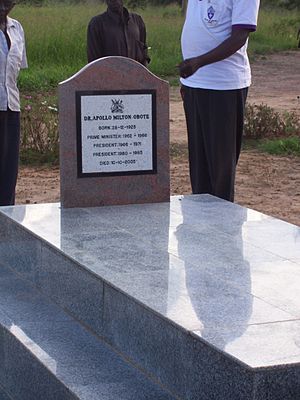- Milton Obote
-
Apolo Milton Obote 
Obote in 1960 2nd President of Uganda
1st Executive President
8th President of UgandaIn office
April 15, 1966 – January 25, 1971
December 17, 1980– July 27, 1985Preceded by Edward Mutesa (non-executive) (1966)
Presidential Commission of Uganda (1980)Succeeded by Idi Amin (1971)
Bazilio Olara-Okello (1985)2nd Prime Minister of Uganda
1st Executive Prime MinisterIn office
April 30, 1962 – April 15, 1966Preceded by Benedicto Kiwanuka (non-executive) Succeeded by None (post abolished) Personal details Born December 28, 1925
Apac District, Uganda ProtectorateDied October 10, 2005 (aged 79)
Johannesburg, Gauteng, South AfricaPolitical party Uganda People's Congress Spouse(s) Miria Obote Apolo Milton Obote (December 28, 1925 – October 10, 2005[1]), Prime Minister of Uganda from 1962 to 1966 and President of Uganda from 1966 to 1971, then again from 1980 to 1985. He was a Ugandan political leader who led Uganda towards independence from the British colonial administration in 1962.
He was overthrown by Idi Amin in 1971, but regained power in 1980. His second rule was marred by repression, and the deaths of many civilians as a result of a civil war known as the Ugandan Bush War.
Contents
Life
Early life
Milton Obote was born at Akokoro village in Apac district in northern Uganda. He was the son of a local chief of the Lango ethnic group. He began his education in 1940 at the Protestant Missionary School in Lira, and later attended Gulu Junior Secondary School, Busoga College and eventually university at Makerere University. Having intended to study law, a subject not taught at the university, Obote instead took a general arts course, including English and geography.[2] At Makerere, Obote honed his natural oratorical skills, he may have been expelled for participating in a student strike, or alternatively left after a place to study law abroad was not funded by the protectorate government.[3]). He worked in Buganda in southern Uganda before moving to Kenya, where he worked as a construction worker at an engineering firm. While in Kenya, Obote became involved in the Kenyan independence movement. Upon returning to Uganda in 1956, he joined the political party Uganda National Congress (UNC), and was elected to the colonial Legislative Council in 1957.[4] In 1959, the UNC split into two factions, with one faction under the leadership of Obote merging with Uganda People's Union to form the Uganda People's Congress (UPC).
Prime Minister
In the run up to independence elections Obote formed a coalition with the Buganda royalist party, Kabaka Yekka. The two parties controlled a Parliamentary majority and Obote became Prime Minister in 1962. He assumed the post on April 25, 1962, appointed by Sir Walter Coutts, then Governor-General of Uganda. The following year the position of Governor-General was replaced by a ceremonial Presidency to be elected by Parliament. Mutesa, the Kabaka (King) of Buganda, became the ceremonial President, with Obote as executive Prime Minister.[2]
In January 1964, there was a mutiny at the military barracks at Jinja, Uganda's second city and home to a burgeoning military. There were similar mutinies in two other eastern African states; all three countries requested the support of troops from the British military. Before they arrived, however, Obote sent Defence Minister Felix Onama to negotiate with the mutineers. Onama was held hostage, and agreed to many demands, including significant pay increases for the army, and the rapid promotion of many officers, including future president Idi Amin.[2] In 1965, Kenyans had been barred from leadership positions within the government, and this was followed by the removal of Kenyans en masse from Uganda in 1969, under Obote's guidance.[5]
As prime minister, Obote was implicated in a gold smuggling plot, together with Idi Amin, then deputy commander of the Ugandan armed forces. When the Parliament demanded an investigation of Obote and the ousting of Amin, he suspended the constitution and declared himself President in March 1966, allocating to himself almost unlimited power under state of emergency rulings. Several members of his cabinet, who were leaders of rival factions in the party, were arrested and detained without charge. In May the Buganda regional Parliament passed a resolution declaring Buganda's incorporation into Uganda to be de jure null and void after the suspension of the constitution.[citation needed] Obote responded with an armed attack upon Mutesa's palace, which ended with Mutesa fleeing to exile. In 1967, Obote's power was cemented when Parliament passed a new constitution which abolished the federal structure of the independence constitution, and created an executive Presidency.
Presidency
Obote's regime, described as "dictatorial and barbaric," terrorized, harassed, and tortured people. Obote's secret police General Service Unit, led by Obote's cousin, was responsible for many cruelties.[5]
Food shortages sent prices through the ceiling. Obote's persecution of Indian traders contributed to this.[5]
In 1969 there was an attempt on Obote's life. In the aftermath of the attempt all opposition political parties were banned, leaving Obote as an effectively absolute ruler. A state of emergency was in force for much of the time and many political opponents were jailed without trial for life. In 1969-70 Obote published a series of pamphlets which were supposed to outline his political and economic policy. "The Common Man's Charter" was a summary of his approach to socialism, which became known as the Move to the Left. The government took over a 60% share in major private corporations and banks in the country in 1970.
During Obote's regime, flagrant and widespread corruption emerged in the name of socialism. The population increasingly hated Obote's rule.[5]
In January 1971 Obote was overthrown by the army while on a visit to Singapore, and Amin became President. In the two years before the coup Obote's relations with the West had become strained. Some have suggested that Western Governments were at least aware of, and may have aided, the coup.[6][7] Obote fled to Tanzania. The fall of Obote's regime was welcomed and celebrated by many Ugandans.[5]
Second term
In 1979, Idi Amin was ousted by Tanzanian forces aided by Ugandan exiles. By 1980, Uganda was governed by an interim Presidential Commission. At the time of the 1980 elections, the chairman of the commission was a close associate of Obote, Paulo Muwanga. Muwanga had briefly been the de facto President of Uganda from 12 May to 20 May in 1980. Muwanga was the third of three Presidents who served for short periods of time between Amin's ouster and the setting up of the Presidential Commission. The other two presidents were Yusuf Lule and Godfrey Binaisa.
The elections in 1980 were won by Obote's Uganda People's Congress (UPC) Party. However, the UPC Party's opposition believed that the elections were rigged and this led to a guerrilla rebellion led by Yoweri Museveni's National Resistance Army (NRA) and several other military groups.
It has been estimated that approximately 100,000 people died as a result of fighting between Obote's Uganda National Liberation Army (UNLA) and the guerrillas.[8]
On 27 July 1985, Obote was deposed again. As in 1971, he was overthrown by his own army commanders in a military coup d'état. This time the commanders were Brigadier Bazilio Olara-Okello and General Tito Okello. The two men briefly ruled the country through a Military Council, but after a few months of near chaos, Museveni's NRA seized control of the country.
Death in exile
After his second removal from power, Obote fled to Tanzania and later to Zambia. For some years it was rumoured that he would return to Ugandan politics. In August 2005, however, he announced his intention to step down as leader of the UPC.[9] In September 2005, it was reported that Obote would return to Uganda before the end of 2005.[10]
On October 10, 2005, Obote died of kidney failure in a hospital in Johannesburg, South Africa.[11]
Milton Obote was given a state funeral, attended by president Museveni in the Ugandan capital Kampala in October 2005, to the surprise and appreciation of many Ugandans, since he and Museveni were bitter rivals.[12] Other groups, such as the Baganda survivors of the "Luwero Triangle" massacres, were bitter that Obote was given a state funeral.[13]
He was survived by his wife and five children. On November 28, his wife Miria Obote was elected UPC party president.[14] One of his sons, Jimmy Akena, is a member of parliament for Lira Municipality.
References and notes
- ^ Birth and death date according to the Milton Obote grave Africa8 069.jpg headstone inscription on his grave
- ^ a b c M. Louise Pirouet (2009). "Obote, (Apolo) Milton (1925–2005)". Oxford Dictionary of National Biography. Oxford University Press. http://www.oxforddnb.com/view/article/96666. Retrieved 17 August 2010.
- ^ I come from royal ancestry, Published in The Monitor
- ^ "The Roots, Emergence, and Growth of the Uganda Peoples Congress, 1600-1985", Yoga Adhola, UPC Website
- ^ a b c d e Phares Mukasa Mutibwa (1992). Uganda since independence: a story of unfulfilled hopes. United Kingdom: C. Hurst & Co.. pp. 65–70. ISBN 1850650667. http://books.google.co.uk/books?id=yURMdAfadS4C&pg=PA67. Retrieved 17 August 2010.
- ^ George Ivan Smith, Ghosts of Kampala: The Rise and Fall of Idi Amin (1980)
- ^ G. S. K. Ibingira , African Upheavals since Independence, Westview Press, ISBN 0891585850
- ^ CIA Factbook - Uganda
- ^ "Uganda's exiled ex-president Obote to retire from party's presidency", Xinhua, August 28, 2005
- ^ "Uganda's exiled ex-president to return home before end of 2005", People's Daily Online, September 2, 2005
- ^ "Former Ugandan leader Obote dies", BBC, October 10, 2005
- ^ "Former foe mourns Uganda's Obote", BBC, October 20, 2005
- ^ "A founding father adored, dreaded in equal measure", The Monitor
- ^ "Walking in Obote’s shadow", Monitor, December 21, 2005 no longer available online
External links
- Obote Series - a series of articles and interviews published in The Monitor
- Amnesty International report on Uganda.
- UPC official Website
Political offices Preceded by
nonePresident of the Uganda People's Congress
1959–2005Succeeded by
Miria ObotePreceded by
Benedicto KiwanukaPrime Minister of Uganda
1962–1966Succeeded by
Otema Allimadi
post abolished 1966–1980Preceded by
Edward MutesaPresident of Uganda
1966–1971Succeeded by
Idi AminPreceded by
Presidential Commission of UgandaPresident of Uganda
1980–1985Succeeded by
Tito Okello LutwaPresidents of Uganda Edward Mutesa II1 · Milton Obote · Idi Amin · Yusuf Lule · Godfrey Binaisa · Paulo Muwanga · Presidential Commission · Milton Obote · Bazilio Olara-Okello2 · Tito Okello · Yoweri Museveni
1 Non-executive 2 de facto Prime Ministers of Uganda Benedicto Kiwanuka · Milton Obote · post abolished 1966-80 · Otema Allimadi · Paulo Muwanga · Abraham Waligo · Samson Kisekka · George Cosmas Adyebo · Kintu Musoke · Apolo Nsibambi · Amama Mbabazi
 Uganda topics
Uganda topicsCommunications · Economy · History · Government · Military · Transport Culture and
religionCricket · Demographics · Education · Football · Healthcare · Languages · LGBT rights · Media · Music · National theatre · Newspapers · Rugby · Wildlife ·
Roman Catholicism · Church of Uganda · Islam · Judaism · Hinduism · Orthodox Christianity
Geography Cities and towns · Districts · Counties · Sub-counties · National parks ·
Kampala · Gulu · Lake Victoria · Lake Albert · Mount ElgonPolitics Constitution · President · Prime Minister · Cabinet · Political parties · Human rights · Terrorism · Foreign relationsEconomy and
infrastructureAgriculture · Central bank · Economy of Uganda · Energy · Fisheries · Forestry · Manufacturing · Ministry of Finance · Transport · Uganda Securities Exchange · Uganda shilling · Water supply · Entebbe Airport · Uganda Railways Corporation
Categories:- Presidents of Uganda
- Leaders ousted by a coup
- Cold War leaders
- 1925 births
- 2005 deaths
- People from Apac District
- Deaths from renal failure
- Prime Ministers of Uganda
- Makerere University alumni
- Ugandan exiles
- Uganda National Congress politicians
- Uganda People's Congress politicians
Wikimedia Foundation. 2010.


